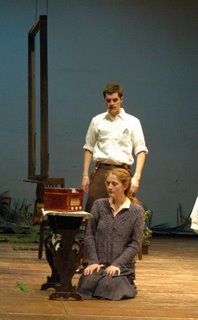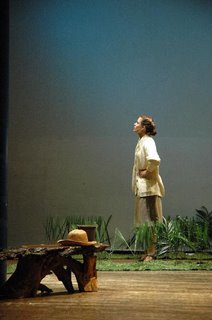 The shrieking strangers (left-right):
The shrieking strangers (left-right):
Rose, Maggie, Agnes and ChrisSTIPIMM: "It’s Time to Say Goodnight"Over the past few years, several people have told that I’m a good audience member. Perhaps so; whether or not it’s a good thing, I tend to have a higher tolerance for suspension of disbelief and more willingness to be drawn into a story than other people. I do have my limits (I’m looking at you,
[name removed]), but in general, I’m willing to watch just about anything, on the stage or on the screen.
That said, I have pretty high standards to be truly moved by films, and even higher standards for plays. The number of stage performances that have really left a lasting impact on me can be counted on one hand, and yes, I’ve seen quite a few in my time. The impact doesn’t have to be particularly profound: one of my select few is “Kenneth, What is the Frequency,” which was a humorous docu-play about the mugging of Dan Rather. But there are a couple, including a surprising production of Ionesco’s “Man With Bags,” that just knocked me out emotionally and psychologically (in a good way!), sticking with me for weeks and months after seeing it.
Add one to the list.
Bridget’s production of “Dancing at Lughnasa,” which took place two weekends ago, was a beautiful work of theatre. Yes, I am a biased observer, but I am objective enough to know the difference between being proud of my wife and being drawn into a exceptionally well-done production of a damn good play. I had read the play twice before I saw the production, and I had seen various aspects of the rehearsal process; I knew plenty about the story and what Bridget had in store for the audience in this production. I saw the finished product three times, and I wept twice during each one. And not just “tear-in-the-eye-‘cause-a-good-Hallmark-commerical-is-on” kind of cry, but a soul-wrenching, “try-hard-not-to-sob-out-loud-in-a-quiet-theatre-you-wuss” kind of cry.
“Dancing at Lughnasa” was a triumph on many levels for Bridget. It was easily the best production she’s ever done, in terms of staging, lighting, performances, and yes, direction. It was her first production in many years that was done in a space* that was actually designed for theatre, and she made it look like she’d always worked there. It made a strong impact on the people in her program, both students and faculty (one staff member said it was “the most professional-looking production” he had ever seen in that space), thus setting her up as the resident “bad-ass” going into her second year. Bridget herself said that she senses that people (mainly underclassmen) who had their doubts about her look at her in a different way. She had a lot of excellent help in her production, not just from the cast and crew that were assigned to her, but also help that she sought out and got (Bridget’s people skills at work), including a great
set designer and a very handsome, ingenious
sound consultant. But no one can doubt that at the center of it all was the sure direction of one Bridget Kathleen O’Leary. As I write this, she’s getting her official critique with two of her professors, and I have no doubt that, other than constructive criticisms and general suggestions, there will be nothing but praise for this production.
 Opening of the play
Opening of the playSo, what was so great about this? Let’s start with the basics. The
play, written by the
leprechaun-looking Irishman
[name removed], centers around a poor Irish family during the summer of 1936 (in Ballybeg, in present-day Northern Ireland). The five Mundy sisters, all unmarried, ranging in age from mid-20s to 40, eek out a meager living to support themselves and the illegitimate seven-year-old son of the youngest sister. It is this son, Michael, looking back as a grown man, who narrates the play, starting from the quotable line “When I cast my mind back to that summer of 1936, different kinds of memories offer themselves to me.” Michael is remembering that particular summer because of the significance it held for both him and all his aunts: his lovable rogue of a father, Gerry Evans, returned to Ballybeg to visit his mother; the sisters’ older brother, Father Jack, returned from a long mission in Africa as a greatly changed man; and the family purchased their first wireless radio, the music from which, as Michael puts it, turned his sober aunts into “shrieking strangers” and injected the dancing of the title into the home.
The play, just on the page, is a superb piece of art. All of its characterizations run deep and shine clearly through the dense idiom and accent of Northern Ireland. The plotlines are at once specific and universal. It was first performed in 1990, and then on Broadway in 1991. It won the Tony Award for Best Play in 1992. It was made into a movie (which Bridget and I will have to see sometime) in 1998 with [name removed] playing Kate, the family matriarch.
 |
Marconi, the "goddamned,
bloody useless set" |
| |
By my reckoning, there are two primary themes running through and driving the action in “Dancing at Lughnasa,” both of which are laid out clearly in the Michael’s opening monologue. The first of these themes is a tried and true one: the struggle between old and new, nature versus industry, humanity versus technology. The dichotomy is set up in Michael’s juxtaposition of the two things that changed for his family during the summer of 1936: the return of Father Jack, and the purchase of the wireless set. Father Jack, a Catholic priest who had spent the past 25 years in a leper colony in Africa, came home a changed man, one who was not so much a priest but a spiritual hybrid who had assimilated the native rituals of the people he was missionary to into his own personal beliefs. Throughout the play, he speaks with glee about the pagan rituals that he witnessed and helped perform while purportedly serving the Church in Africa. As the play goes on, it becomes clear that he didn’t just come home to visit, but that he was sent home by his superiors for good. His mind appears quite confused, forgetting basic English words (most notably “ceremony”), but in fact, he is quite at home in his own mind and his own beliefs. He represents an embracing of nature, of ceremony, of ancient tradition and the imperfections therein. As for the wireless set (which sometimes works and sometimes doesn’t), which the family has dubbed “Marconi” (“the name emblazoned on the side”), it represents the inevitable surge of modernity into what is otherwise a poor little shack of a household.
 The Mundys: Rose, Agnes, Jack, Maggie, Chris and Kate
The Mundys: Rose, Agnes, Jack, Maggie, Chris and KateAt the intersection of these two symbols, Father Jack and Marconi, are the Mundy sisters themselves. Each of them is affected in their own unique way by the arrival events of the summer. There’s the youngest, Chris, Michael’s mother, who is hopeful, despite all evidence to the contrary, that her son’s father, Gerry, will finally settle down and marry her. There’s the simple-minded Rose, whose reckless embrace of love and life is looked on warily by her other sisters. There’s Agnes, whose meager livelihood (knitting gloves) is threatened by the arrival of a factory. Then there are Maggie and Kate, the two richest characters in the play, but who I can’t manage to introduce separately, so intertwined are their fates. Maggie is “the joker of the family,” who is eternally optimistic and fun-loving, while Kate, the puritanical oldest sister, struggles to keep the family from falling apart both materially and spiritually. They are at once opposites and equals, both fighting for the same thing (the strength of the family) and doing it together, and yet both going about it in vastly different ways. Both of them alternately serve at the other’s antagonist and confidante.
One of the most powerful moments of the play (one of the two that made me cry without fail) takes place in Act One. To this point, Kate has forbade the rest of the family from going to the Harvest Dance, saying it was not something that respectable women of their age should do. This despite the fact that all her sisters are desperate to go out and dance. The act of dancing is one that we quickly see is representative of their youth and promise, and nowhere is this made clearer than in Maggie’s monologue in which she speaks longingly about a dance contest that she and her best childhood friend had gone to. Right after this monologue, in which Maggie reveals the pain she feels in the memory of her childhood, Kate offers to break the silence by having Marconi turned on. The song that comes on is a rousing jig that quickly inspires Maggie to…well…go a little batty for a minute, smear flour on her face, and dance wildly around the house. Her sisters (other than Kate), all join her in a raucous, crazy dance. The combination of the music, the movement and most of all, the memory, finally push Kate to let go. She leaps up, screaming like her sisters, but much more from the gut, and dances a measured, but intense dance, by herself. As she dances, she reaches up to the sky, as if begging God to both forgive her and allow her to embrace this bodily pleasure one more time. It’s a beautiful, powerful moment, where the breadth of both Kate and Maggie’s characters are revealed at once. And needless to say, Bridget’s staging of this scene was incredible.**
 |
Agnes (Liz Palin),
looking for a man." |
| |
The other major theme of the play is the bittersweet quality of memory. You can see how important memory is in the scene I just mentioned: it is memory that sets off both Maggie and Kate into their ecstatic motion. But from the first line of the play to the final moment before the lights go down, memory is the paint in which Michael, the narrator, makes this canvas. He freely concedes that all memory, especially his own, is imperfect. Indeed, more than imperfect, it is something that transcends any notion of “truth” or “reality.” Memory creates its own world, where feeling and atmosphere is as important as anything that is actually said or seen. As the play comes to a close, you are left with the feeling, that is both unsettling and comforting, that nothing that you have just seen happened quite like it is remembered. Indeed, after seeing it as many times as I did, you kind of understand that so many of the details or conversations that we see might not have happened that summer at all, but may have happened before or after the summer of 1936; the only things we know for certain are the limited things that Michael tells us as an adult. But what unites all the disparate events into that timeframe of 1936 is solely Michael’s memory, and that is all that is important. I was regularly reminded of a line from the end of the movie “A River Runs Through It” (high on my list of the best movie endings of all time): “Eventually, all things merge into one, and a river runs through it.” In “Dancing at Lughnasa,” it’s not a river, but the Mundy household, and most importantly, his aunts, that run through and shape his memory.
 |
There were never
such devoted sisters.
Or maybe there were... |
| |
One area in which this shaping of memory is clear is how he remembers his aunts. Michael clearly remembers interactions with his aunts Kate, Maggie, and his mother, Chris, each one displaying the deep love they feel for the boy in very different ways (note that there is no one actually playing the seven-year-old Michael, in this production or any other; the adult Michael says the boy’s words, but the aunts play to a child that isn’t really there). But Michael never once speaks to his aunts Agnes and Rose; his sole interaction with them is a kiss that Agnes blows to him through a window. Later in the play, we come to find out why they don’t hold as a strong place in his childhood memory – the pair left at the end of the summer, never to visit or contact their sisters again. The characters of Rose and Agnes are not roughly drawn, but it is clear in how [the playwright] created all five sisters, that the detail of their characters depended on how important a role they played in Michael’s life.
And as we near the end of the play, the impact that his mother, Aunt Kate and Aunt Maggie had on Michael’s memory, and on his life, comes to the foreground. His final monologues are almost confessional – talking about how he hid from his mother the knowledge that his father had another family that he was devoted to, and how, “in that selfish way of young men,” he left the household of spinsters as soon as he became an adult. You get the sense that he didn’t cut himself off from his family, as his Aunts Agnes and Rose did, once he left, but there is deep guilt buried in his words, guilt that he left the women who raised him behind as he went off to pursue a new life.
But what is reawakening this guilt, and what is causing Michael, as an adult, to revisit his childhood memories? This was an important question for Bridget to answer going into the process, one that she labored over. My own take, after seeing the play, was that Michael was looking back after the death of his mother, presumedly after Kate and Maggie had died as well.
 The final monologue
The final monologueThe last moments of the play point to this more than anything else. The final scene consists of all the characters in the play gathering right outside the house to have a small dinner as the sun goes down. In this moment, nothing is really resolved, nothing climactic has actually happened. Michael has told us, in his monologues, what *will* happen later: his father will be injured in the Spanish Civil War; his mother and aunts will never marry; Father Jack will die less than a year later; Rose and Agnes will leave for good in less than two weeks. But at that moment, during that sunset in the summer of 1936, even though things were about to fall apart, the Mundy household was together. And as the family watches the sun go down, Michael chooses that moment to hold in his mind as the feelings wash over him, just as the red of the sunlight is washing over the family. He turns the radio on, and a melancholy song comes on. The family begins swaying subtly to the music. Michael ruminates over how this moment plays in his own mind – not really an image, per se, but a feeling, where there is atmosphere that transcends the need for words and descriptions. And after he says the final lines of the play, the song “It’s Time to Say Goodnight,” rises over the speakers and fills the room. Michael walks over to where his family is sitting, watching the sunset, and moves to sit down on the blanket, where his mother, and his Aunts Kate and Maggie are waiting for him. Note that, to this point, the adult character of Michael has not been a part of the interactions of the play, save as the voice of the seven-year-old boy. But now, while all the other characters (Jack, Gerry, Agnes and Rose) are sitting apart from them, looking off in their own directions, Michael sits down with the three women who loved him best. And without a thought, the three women welcome him back into his memory, his mother reaching out to touch his shoulder, while his aunts look to him with strong, quiet love. It is a moment of supreme forgiveness and release, a moment (not explicitly called for in the original script) in which Michael forgives himself and allows himself to relive this treasured moment. The four of them sit back, together, and watch the sun set as the lights fade to black.
I’m sitting here at my desk with tears in my eye just remembering this beautiful moment, and you can bet I was balling when it was actually happening. Yes, I cry at just about
anything, but even I was surprised that, even though I knew what was coming by the third time I saw it, I kept being brought back to that emotional place. Bridget created a theatrical event that, while imperfect in minor ways (no art, after all, is "perfect"), will live in my memory for a long time to come, and not just because she’s my wife, and not just because I had some part of the sound, but because it was truly a wonderful piece of theatre.
* Note to laymen: When I say “space,” I mean the actual room/theatre the performance took place in.
** A very funny accident happened during this scene on the final performance night. Maggie, played by [name removed], smeared the flour on her face and then proceeded to dance wildly. At that moment, the fastener on her skirt gave way and fell fully to the floor, exposing her legs and a very pink, non-1936 pair of panties. She quickly grabbed her skirt back up and her stunned co-stars recovered, joining what was suddenly an even wilder dance than usual. The audience roared and applauded as Maggie danced with abandon, holding her skirt to her waist as best she could. And poor, poor Kate had to keep a straight face while the rest of the room (including the cast) was doubled over in gleeful laughter. She only partially succeeded, which made her transformation into one of the “shrieking strangers” doubly interesting, if not as sudden. What was perhaps the most wonderful thing about this random theatre moment is that it was totally within Maggie’s character for something like that to happen and then continue to dance, skirt askew, around the room. Well… besides the pink panties… but then, maybe that was something about Maggie we never knew before…











